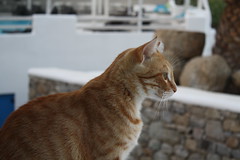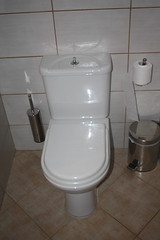This is the final installment of my 4 part series about my trip to Greece. See parts one, two and three.
I saved the best for last. Here I’m going to talk about my reactions to some of the differences between California and Greece.
The weather
In Greece, more often than not, I found myself covered in sweat. With the 100+ degree heat and the occasional humidity spell, this is understandable. But the amazing thing is how rapidly I was sweating.
I’m not saying my deodorant was failing. No, this was an all-over kind of sweat, where you need to take a shower. I’d shower the sweat off, but by the time I was done toweling myself off I was already covered in sweat again. Cleaning yourself becomes a lost cause.
I never thought I’d miss the cold, foggy weather in San Francisco. But I did.
Municipal animals Stray animals in the US are either adopted, or put down by the authorities. But do we really need to?
Stray animals in the US are either adopted, or put down by the authorities. But do we really need to?
In Greece, stray dogs and cats are given shots by the government, but they’re not incarcerated in a shelter. Instead, they’re allowed to roam freely with government vets giving them shots now and then.
I semi-jokingly call these wild domestic pets “municipal animals” since they’re like pets for everyone to use.
Anywhere outdoors that you might find people, you would also find municipal animals begging for food and attention. Most Greek restaurants and bars are outdoors, and while eating you would often be visited by feline beggars. On the one hand, that might seem unclean. But on the other, cats keep away the rats and birds. Also, they’re adorable.
Serious problems
One restaurant owner in a small town said to us, when told him where we lived: “Arnold Schwarzenegger!” He then said, somewhat vaguely, “I hear California has problems.” Marc came back with “I hear GREECE has problems.” It’s funny because it’s true; both California and Greece are in bad shape financially, and both have an immediate and dire employment crisis.
But the differences are striking as well. During our time in Greece, we hit a snag with gasoline availability. Due to legal changes that will make retirement a challenge for them, tanker truck drivers went on strike.
Imagine if you couldn’t get gas. Now I know, most San Franciscans wouldn’t care, they’d just walk and bike… right? WRONG. Gas doesn’t just affect your commute, it also affects the food supply, emergency services… without gasoline we’re basically all screwed.
Greece’s gas crisis went on for 4-5 days. Thankfully, there were a few stations here and there that remained open. All of those stations had lines, and it wasn’t uncommon to see people pushing their cars to the tanks.
Basically we got lucky with this one; we never got stranded. We spent a lot of time worrying about the issue, and went to the trouble of calculating the mileage of our Hyndai Accident Accent and how much the tank could hold. Based on that, we could figure out how far we could get at any given time. It’s not particularly difficult to do but it’s also not something you ever want to have to do.
Plumbing When you travel to Europe, you don’t think plumbing is going to be a problem. It’s not like you’re going to a tiny village somewhere in Asia where you have to shit in a hole.
When you travel to Europe, you don’t think plumbing is going to be a problem. It’s not like you’re going to a tiny village somewhere in Asia where you have to shit in a hole.
But while Greece does have flush toilets, said toilets do not take paper products. Those go in a little trash can next to the toilet. As you can imagine, this trash can smells awful. Especially in the 100 degree weather.
Greek showers tend to be the “hose” variety. Expect a small shower stall or bathtub with a shower head on a hose. Fortunately the water pressure tends to be very high, so this isn’t as bad as it sounds. Water pressure trumps shower design any day.
And yes, you can drink the tap water. Sometimes. On the islands, I’m told it’s not necessarily safe to drink the water, or even get it in your mouth while brushing your teeth. But the price of bottled water is regulated by the government so this was never an economic concern.
Service expectations
In the US, if you ask for your check at a restaurant, you can expect it in what, five minutes? Maybe 10, tops?
In Greece, it often took more than half an hour. Some restaurants would bring a free desert, and not come back with the check until after you finished. Free desert is always good, but when you ask for a check you expect to get it. This wasn’t the only part of the restaurant service that seemed to be operating on a different time scale than the rest of the world, it was just the most noticeable.
Sure, it’s good to relax, and it’s not good to always be in a rush. But let’s be realistic: taking too long is just bad service. Promptness is appreciated in every culture, so it’s not a cultural difference in that sense. And in fact, the cooked food always came to the table promptly. The difference is priorities; the Greeks don’t prioritize timeliness in the same way we do in America, so people can get away with taking their time. If service was faster, I don’t think anyone would feel rushed or as though they were being kicked out of the place. But those people in a hurry would be grateful.
What do others think?
We kept meeting service industry workers who were from other places; Australia, Texas, and — get this — Oakland. None of them seem to have adapted to the Greek culture.
When asked, the conversation would go something like this:
Me: “Have you gotten used to the Greek concept of timeliness?”
Them: “NO!!! That and other things…”
It’s good to know you’re not alone.
Conclusion
Should you go to Greece? Hey, I’d say as long as you don’t go during the hottest part of summer, yes. The food is great, the beaches are really nice, and there’s a lot of historical sites to visit. Hell, in terms of history and beaches, you really can’t beat Greece.
That said, I hope this guide helps manage your expectations. And if you do go, I hope you have better luck with the strikes than we did.
